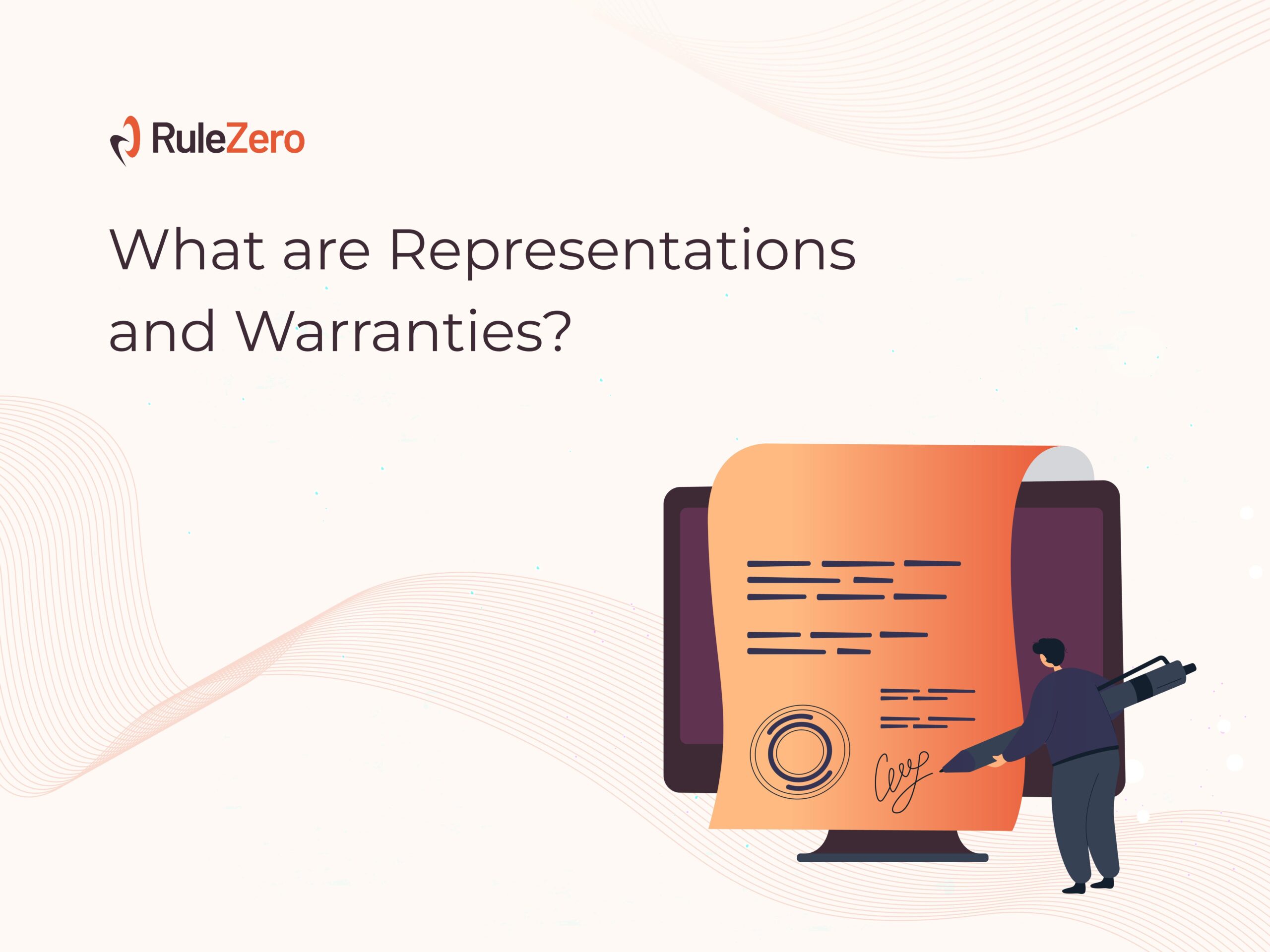A prominent clause found in most contracts is on representations and warranties of the parties. Such a clause is found in an investment agreement too, which is a contract between a company, its founders, and investors. It’s worth paying attention to this clause and going through each of the points carefully.
Why, you may ask – since your lawyer will anyway review this ‘fine print’ too, along with all the rest of them? Allow us to explain. This article covers the meaning, importance, and role of the representations and warranties clause in an investment deal, and why it’s not merely a bit of ‘legalese’ that you should leave to a lawyer!
What do representations mean?
Representations are basically statements or claims. In the context of an investment deal, they are statements made by the parties to the deal, that is, the company, founders, and investors, to each other. These statements cover certain basic but important facts, about a party’s legal status, its ability to enter into an agreement, its operations and management, financials, and so on.
The clause containing representations states that each party’s statements, and information provided to the other party/s, are true, accurate, and complete. Its significance is that the other party has relied on these statements and claims to enter into the transaction.
What are some typical representations made in an investment deal?
By company and founders:
Representations by the company and founders are related to the company’s ownership states, financials, operations, governance, management, etc. Some examples are:
- Neither the company nor any of the founders are involved in any activity that could negatively affect the company’s business, such as, being an investor, advisor, or employee in a competing company.
- All persons involved in the execution of the investment deal have the authorisation to sign the documents on behalf of the company.
- The authorised and issued share capital of the company, as well as the equity and shareholding pattern of the shareholders disclosed are true.
- The company has not made any illegal payments, such as giving a bribe to government officials, contractors and so on.
- All the assets required for the conduct of the business belong to the company.
- Every contract that is in the company’s name is legal, valid, and enforceable.
- All corporate governance matters necessary to keep the operations of the company clean and effective have been followed. For example, forms, returns, reports, filings, registers, minute books etc., have been filed and maintained. The company has also received necessary approvals of the board and the shareholders on various corporate matters.
- The books of accounts maintained are fair and true and in accordance with appropriate accounting standards.
- All applicable labour laws, policies, and procedures relating to payment of salaries, commissions, bonuses, leaves etc., have been complied with.
- The company has followed all applicable rules prescribed by SEBI, RBI, and other regulatory bodies. For example, if the company has received any foreign investment previously, then it must state that these investments are well within the sectoral limits; the allotment/transfer of shares to foreign investors have been made according to the provisions of the Companies Act, as well as applicable RBI and SEBI regulations.
- The company is socially responsible and has taken conscious steps to decrease carbon emission, pollution.
- All legal rights to the intellectual property in the form of patents, trademarks, service marks, trade names, copyrights, trade secrets, licenses required for the conduct of the business are owned and in the name of the company.
- If there are any pending/ongoing court orders, appeals, civil or criminal matters that the company is facing, information regarding the same has been disclosed.
By investor:
If you’re a founder, it’s your duty to the company and other stakeholders to make sure that the investors coming into the company and taking their place on the cap table are genuine. After all, investors become owners of the company and have statutory and contractual rights as shareholders. These rights should not end up hampering the company’s growth or block its vital decisions. Hence, companies also seek representations from the investors. Usually, investors state that they are:
- Eligible to enter into the investment deal and perform all actions necessary as a shareholder of the company.
- The funds invested in the company are sourced only from legal activities and are not in violation of any law.
What are warranties?
Warranty is a confirmation given to one party by the other (for example, to an investor by a company and/or its founders) that all statements made and information provided are true as on a specific date. A warranty, accompanied with indemnity, provides security to the parties of the investment deal.
Indemnity acts as a redressal mechanism for the party that has relied on the warranty, in case of a breach. That is, if any of the representations is found to be inaccurate, untrue, or incomplete. Here, redressal mechanisms will include:
- Payment of damages (money) by the breaching party
- Termination of the agreement (although, this is not very common)
Exceptions to representations and warranties and disclosure letter
This blog would be incomplete if we did not talk about exceptions to representations and warranties. As important as a deal may be to a company or its founders, signing an agreement with representations and warranties means that the investors are being assured that no wrong facts or incomplete information has been given them, just to lock the deal or get the investment.
Hence, if there are any legal, operational, or financial matters about the company that are not accurately stated in the representations made, they need to be brought to the investor’s attention. Such clarifications constitute exceptions to the representations and warranties must be stated in a disclosure letter signed by the company and founders, usually simultaneously with the signing of the investment agreements. These disclosures could decide the direction of the investment deal, and so being forthcoming right from the beginning will aid transparency and avoid any surprises for the investor.
Representations and warranties are read along with the disclosure letter, to form a complete picture. Candid and complete disclosure means that an investor is aware of all important and necessary information, and this will avoid the possibility of a claim for damages by the investor alleging misrepresentation of facts.
Disclosures could be general or specific facts related to the company or the founder. For example:
- Any ongoing dispute or litigation involving the company or management.
- Unsecured loans taken by the company.
- Records not maintained or documents not filed under the Companies Act, 2013.
- Corporate governance policies like IT, HR, privacy policies, etc., not being in place
- Options granted without a stock option plan.
The clause on representations and warranties is meant to indicate the seriousness of the parties entering into an agreement. Making a representation and giving a warranty means that you are aware that another party is relying on them while transacting with you. It also helps cover any losses in case either of the parties have hidden or misrepresented facts just to win the contract. This is why the clause is found in almost all agreements.










